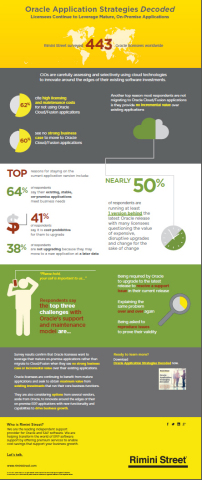AS VEGAS--(BUSINESS WIRE)--Rimini Street, Inc., the leading independent provider of enterprise software support services for SAP SE’s (NYSE:SAP) Business Suite and BusinessObjects software and Oracle Corporation’s (NYSE:ORCL) Siebel, PeopleSoft, JD Edwards, E-Business Suite, Oracle Database, Oracle Middleware, Hyperion, Oracle Retail and Oracle Agile PLM software, today announced that a majority of global Oracle licensees recently surveyed are leveraging their existing, mature on-premise applications at the core of their ERP application strategy. The top reasons cited for not migrating to Oracle Cloud/Fusion applications are “High Licensing and Maintenance Costs” and “No Strong Business Case.” “No Incremental Value over Existing Applications” was also cited as a top reason for not migrating. The results are part of Rimini Street’s second annual global survey of 443 current Oracle application licensees including executives, IT and procurement professionals representing a range of industries and company sizes in North America, Asia-Pacific, Europe and the Middle East, to understand their challenges, priorities and plans for 2016 and beyond.
“This year’s results confirm that Oracle licensees are continuing to benefit from their mature on-premise applications to run core business functions, and are looking at options from several vendors, not just Oracle, to extend their existing application investments with new functionality and capabilities,” said David Rowe, senior VP and chief marketing officer, Rimini Street. “CIOs are carefully assessing and selectively using cloud to innovate around the edges of their existing software investments. When asked about key reasons they may plan to use Oracle Cloud/Fusion applications, many cited ‘to extend their existing on-premise Oracle applications.’”
Many Oracle Licensees Not Committed to Upgrading Current On-Premise Applications
According to the survey, nearly half of Oracle licensees are running at least one version behind the latest application release. The results found that a significant portion of Oracle licensees are questioning the value of expensive, disruptive upgrades and “change for the sake of change.” Oracle customers that are not committed to upgrading stated that their existing, stable and mature on-premise applications “Meet Business Needs.” Another key reason cited by Oracle licensees for not upgrading is that it is “Cost Prohibitive.” Overall, Oracle licensees’ application roadmaps and strategies lean towards extracting maximum value out of their existing systems and platforms, and avoiding expensive and unnecessary upgrades and re-platforming without a solid business case.
“IT decision makers no longer need to upgrade their ERP platforms to add new functionality such as mobility, analytics, social and digital capabilities,” explained Rowe. “The vision for a next-generation ERP platform in the hybrid IT era is coexistence and flexibility, with individual solutions based on functional need, ease of use and agility.”
Licensees Frustrated with Oracle Annual Support
Survey respondents continued to voice their frustrations with Oracle annual support and maintenance inefficiencies. For example, Oracle annual support customers said that being required to “Upgrade to the Latest Release” to resolve a support issue in their current release was their number one challenge. Additional reported challenges with Oracle support included time- and labor-intensive activities such as “Explaining the Same Issue Multiple Times” and “Reproducing the Issue to Prove Its Validity.” Many Oracle licensees are questioning whether they are receiving fair value for their annual support and maintenance contracts, which are typically calculated at the Oracle standard rate of 22% of the original cost to license the software.
“Oracle licensees are asking questions about whether they should remain on their stable and scalable on-premise applications, or remain on a continuous and expensive upgrade cycle that does not allow for a strong return-on-investment,” continued Rowe. “At Rimini Street, we have dedicated the last 10 years to helping clients maximize the return-on-investment on their existing core ‘systems of record’ and avoiding unnecessary upgrades, while allowing them to continuously evolve and grow their business.”
In its second annual survey of Oracle application customers worldwide, Rimini Street collected data from executives and professionals across a wide variety of roles within IT and IT procurement, ranging from C-level executives, to VP’s, directors and managers. Respondents spanned major geographic regions, including North America, Asia-Pacific, and Europe and the Middle East.
To download a copy of the survey results eBook, visit: http://www.riministreet.com/oraclesurvey2015.
To learn more, follow @riministreet on Twitter and find Rimini Street on Facebook and LinkedIn.
About Rimini Street, Inc.
Rimini Street is the global leader in providing independent enterprise software support services. The company has redefined enterprise support services since 2005 with an innovative, award-winning program that enables Oracle and SAP licensees to save up to 90 percent on total support costs. Clients can remain on their current software release without any required upgrades for at least 15 years. Over 1,150 global, Fortune 500, midmarket, and public sector organizations from a broad range of industries have selected Rimini Street as their trusted, independent support provider. To learn more, please visit http://www.riministreet.com.
Forward-Looking Statements
This press release may contain forward-looking statements. The words “believe,” “may,” “will,” “estimate,” “continue,” “anticipate,” “intend,” “plan,” “expect,” and similar expressions are intended to identify forward-looking statements. These forward-looking statements are subject to risks and uncertainties, and are based on various assumptions. If the risks materialize or our assumptions prove incorrect, actual results could differ materially from the results implied by these forward-looking statements. Rimini Street assumes no obligation to update any forward-looking statements or information, which speak only as of the date of this press release.
Rimini Street and the Rimini Street logo are trademarks of Rimini Street, Inc. All other company and product names may be trademarks.





